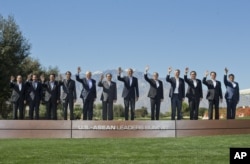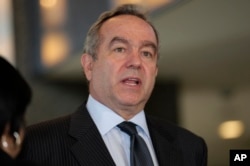President Barack Obama says a pivot of U.S. foreign, military, and economic policy toward Asia is paying off and will continue. But critics say the trade deal that is the most important economic component of this so-called rebalancing of Washington’s attention and resources is in serious trouble.
ASEAN
Speaking in California at a recent meeting of leaders from Southeast Asia, Obama said efforts to improve the rule of law will encourage more trade and investment between the United States and members of the Association of Southeast Asian Nations.
The 10 nations of ASEAN represent a population of more than 600 million and an economy totaling around $2.4 trillion. Together, the ASEAN nations are already the top destination for U.S. investment in Asia – amounting to $226 billion last year. That’s more than the U.S. investment in China, Japan or South Korea.
White House officials say Obama has been working to pivot or "rebalance” policy toward Asia since he took office, because of the region’s strategic and growing economic importance.
Economic issues
Michael Auslin of the American Enterprise Institute says the pivot was largely a response to worries that the balance of power in the region was shifting away from the United States and liberal democratic nations and toward China.
Many concerns grew out of military issues, but the new Asian Infrastructure Investment Bank is an example of the growing economic challenge as well. The AIIB has 57 member nations and started with $100 billion in capital, nearly a third of that coming from China. The U.S. is not a member of AIIB, and the new bank positions itself as an alternative to the World Bank, which is heavily influenced by the United States.
The most important economic part of the Obama administration’s pivot to Asia is the trade deal called the Trans Pacific Partnership, which AEI Asia scholar Auslin says faces an uncertain future.
TPP groups 12 Asia-Pacific nations, including the United States and some members of ASEAN. Auslin says freer trade between the United States, Japan and other TPP nations could help the economy. Treaty supporters also say it is also a chance for Washington and other TPP nations to craft the trade rules of the future. China is not part of a member of the TPP.
Skeptical Congress
While the TPP has been signed by its member states, a skeptical U.S. Congress must approve Washington's full participation. Obama usually gets congressional support from members of his Democratic Party, but many of them oppose the TPP because they contend it will cost U.S. workers their jobs. Republicans, who control both houses of Congress, usually support trade deals, but this "partnership" is different: many Republicans, including some who are running for president, oppose it.
Auslin says the TPP faces an extremely difficult fight in Congress. And without the United States, he adds, TPP membership will have little value.
Criticism 'overwrought?'
One of the architects of the pivot to Asia, Kurt Campbell, has written that worries about the lack of progress in the rebalance to Asia are “overwrought,” but should be “taken very seriously.”
Campbell was assistant secretary of state for East Asian and Pacific affairs until 2013, and previously held high ranking positions at the Pentagon and White House dealing with Asian issues.
The TPP can have a "decisive" effect on members' growth, Campbell wrote in 2014, and he urged his former boss, President Obama, to push harder for the deal's approval.
With anxieties on the rise in an “increasingly uncertain” region, Campbell says more U.S. engagement with key nations like China, India, and others in Southeast Asia could have a calming effect.
Washington and Beijing should strive for “practical cooperation," he says, by building up their military relations and working together on issues such as development, energy security and disaster relief.
Campbell now heads The Asia Group, a private firm that advises investors and others. He says the U.S. needs to consider opportunities in Vietnam, Indonesia, Thailand and Myanmar.
The focus on economic issues has been sharpened by recent trading chaos on stock and oil markets, concerns about slowing growth in China and a recent downgrade in predicted global economic growth from the Organization for Economic Cooperation and Development.







